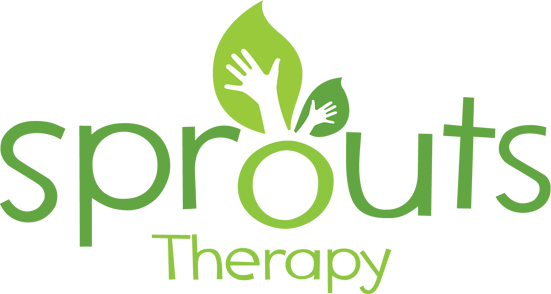Pediatric Occupational Therapy

A child's "occupation" is playing.
Children need play in order to grow and develop age-appropriate skills and to meet their developmental milestones.
Occupational therapy uses play as a central treatment tool to help children improve skills, increase neuroplasticity of the brain, and develop greater daily independence. The goal of a pediatric occupational therapist is to help each child participate in activities of daily life, such as playing, dressing and caring for themselves, engaging with others, helping around the house, and participating in school and community activities.
Occupational Therapy at Sprouts Therapy
At Sprouts Therapy, the therapist and your child interact in a sensory-rich environment with lots of opportunities to experience tactile, visual, auditory, and movement inputs. The clinic is chalk full of play equipment to encourage swinging, spinning, riding, jumping, sliding, and climbing. The environment is created to feel like a giant playground for your child. Sessions are structured so your child is challenged but successful in completing each activity. When Occupational Therapy is effective, children improve their ability to accurately detect, regulate, and interpret sensations in order to execute appropriate motor and behavioral responses. This assists them in performing everyday “occupations” in a functional manner.
Children who benefit from Occupational Therapy
- Children who are challenged in reaching their developmental milestones (in social, communication, self-care, fine and gross motor skills)
- Children who have difficulty tolerating, navigating and accessing their environment
- Children who have difficulty regulating emotions (meltdowns, rigidity with schedule, short fused, etc)
Common Conditions We Support
- Developmental Delays
- Autism Spectrum Disorders
- Sensory Processing Disorder
- Self/Emotional Regulation Difficulties
- Visual Deficits (Motor, Perceptual, Functional)
- Fine Motor Delay
- Handwriting Deficits
- Difficulty with Hand-eye and Finger Coordination
- Gross Motor Delay (Sensorimotor, Bilateral Coordination, Low Muscle Tone, and Postural Instability)
- Praxis/Motor Planning Difficulties
- Unintegrated Primitive Reflexes
- Lack of age appropriate play skills/toy engagement
- Anxiety
- Attention and Concentration Deficits (ADD/ADHD)
- Learning Difficulties
- Executive Functioning Deficits
- Social Skill Difficulties
- Neurological Disorders
- Down Syndrome
- Cerebral Palsy
OT Specialty Programs
- Safe & Sound Protocol
- DIR Floortime
- Handwriting Without Tears
- The Zones of Regulation
- The ALERT Program
*Specialty Programs based on therapist recommendations and availability*
Does my child need occupational therapy?
All children are different and develop skill sets at their own pace. However, if you think your child is struggling with adopting some of the skill areas below, and that his or her challenges are impacting day to day activities at home, school or in the community, your child may benefit from occupational therapy.
For more help in determining what skills are appropriate for what age, view these developmental milestones for ages two months to five years.
The Evaluation Process
Initial evaluations are necessary to determine whether your child qualifies for therapy services and to create a specialized therapy program if services are needed.
What to Bring
Please bring prescription glasses, hearing aids, durable medical equipment, or AAC devices your child may use (if applicable).
Assessment Details
Your child’s OT Evaluation will include a 1-1.5 hour evaluation/parent consultation. Evaluations typically consist of standardized testing, observations in a clinical setting, and parent-report measures. Because all children are different, your evaluating therapist will determine appropriate testing methods based on your child’s needs. A pediatric OT evaluation may include assessment of: Gross/sensory motor, fine motor, activities of daily living (ADLs), sensory processing skills, functional vision skills, visual motor/perception skills, play skills, executive functioning skills, and primitive reflexes.
The Report
You will receive a detailed evaluation report and plan of care via our HIPAA compliant software system (Therabill), within your personal client portal approximately four weeks after the assessment. If you have any questions after reviewing the evaluation report, we can set up a complimentary phone consultation with you and the evaluating therapist.
(If your child already has a recent evaluation from another facility, we may be able to use that evaluation to prepare a plan of care and begin treatment.)
The Scheduling Process
If the evaluating therapist has determined your child would benefit from therapy treatment, you may begin scheduling sessions immediately after the evaluation, while waiting for the full report. If there are no ongoing appointments available during your availability window, your child will be added to the waitlist. We may email you one-time openings, as available. These are offered on a first-come, first-serve basis until an ongoing session becomes available for your child.
Occupational Therapy is offered through teletherapy, in-clinic or a combination of both.
For clients attending Sprouts at a recommended frequency of one session per week, your child will typically see the same therapist on the same day at the same time. If a child receives multiple weekly treatments, they may be scheduled with a different therapist on different days of the week. Each of your child's therapists are able to view daily notes from previous sessions. When multiple therapists observe your child demonstrating a new skill, it ensures the child is progressing in skill generalization.


